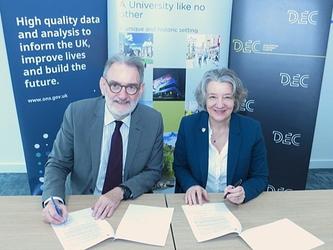A better proportion: Improving government’s use of stats

You can’t have an election campaign without statistics – from the daily opinion polls to the statistical claims of those campaigning for office – the numbers are vital for measuring progress and telling stories. Voters were confronted by an overwhelming number of stats from all sides during the election, and often the statistic became the headline.
All parties received firm words from Robert Chote, the chair of the UK Statistics Authority once the election was announced, asking them to ensure that any statistical claims ‘enhance understanding’ rather than being used in a way that could be misleading. However, it wasn’t long before they were all getting into trouble, from the Lib Dems’ infamously dodgy bar charts (which have a dedicated X account), to Labour overstating NHS waiting lists, and Rishi Sunak’s claims on Labour tax increases that led to a statement from the stats regulator.
All of this, of course, can be slightly overwhelming for those deciding who to vote for, and organisations like Full Fact did a great job of thoroughly fact checking the claims so we didn’t have to. The problem is of course, statistics aren’t really made for soundbites that election campaigns rely on: they need context. Who were they produced by? Does this one statistic cited tell the whole story? What are the levels of uncertainty? There are so many questions to ask, and we at the Royal Statistical Society (RSS) were pleased to produce a guide on quick checks we can all make to critically assess such claims.
A lot of the stats we saw over the campaign were not entirely wrong, but without the full context surrounding them could not be seen as exactly enhancing public understanding as Robert Chote had asked for. We may not typically hold politicians in the highest esteem, but they are busy people, covering an enormous and wide-ranging brief and it’s easy to get stats wrong.
This is why we’re calling for all new ministers to receive some level of training in interpreting data. This is so important when numbers underpin so much of decision-making. Patrick Vallance said in his diaries during his time as chief scientific advisor over Covid that then prime minister, Boris Johnson, struggled to understand the data – a worrying thought during a time of national emergency. Now Vallance is minister for science, we are hopeful he will push for this inside cabinet.
For a strong independent statistical system, as the UK is lucky to have, public trust is essential. One thing we see as undermining that trust, and that the RSS has long been campaigning on, is an end to pre-release access to statistics. The Office for National Statistics (ONS) removed this for their statistics in 2017, but for statistics produced by other government departments and by the devolved nations, ministers and other officials are still getting to see the figures before the public does, meaning they are able to prepare any potential spin. When government statisticians work so hard to provide us with the data we need, it’s only right that the process around releasing it is transparent.
This is something the Code of Practice for Statistics, which sets the standards for UK official statistics, picks up too, saying early access should only be limited to those involved in the production of the statistics and their release. Currently the ministerial code says ministers should ‘be mindful’ of the code: we want to see this go one step further – and see ministers pledge to abide by it.
We would also like to see greater data sharing between government departments. Currently there are too many barriers and obstacles which hamper the government’s ability to have the full picture and make the right decisions. Improving our data infrastructure may sound rather abstract but it will mean that public services can run better and people will have better lives.
Now is not the time to delay. Getting the data right will allow the new government to focus on the outcomes that matter and make the UK a better place for us all.
Dr Sarah Cumbers is chief executive of the Royal Statistical Society

We hope you enjoyed this article.
Research Live is published by MRS.
The Market Research Society (MRS) exists to promote and protect the research sector, showcasing how research delivers impact for businesses and government.
Members of MRS enjoy many benefits including tailoured policy guidance, discounts on training and conferences, and access to member-only content.
For example, there's an archive of winning case studies from over a decade of MRS Awards.
Find out more about the benefits of joining MRS here.













0 Comments